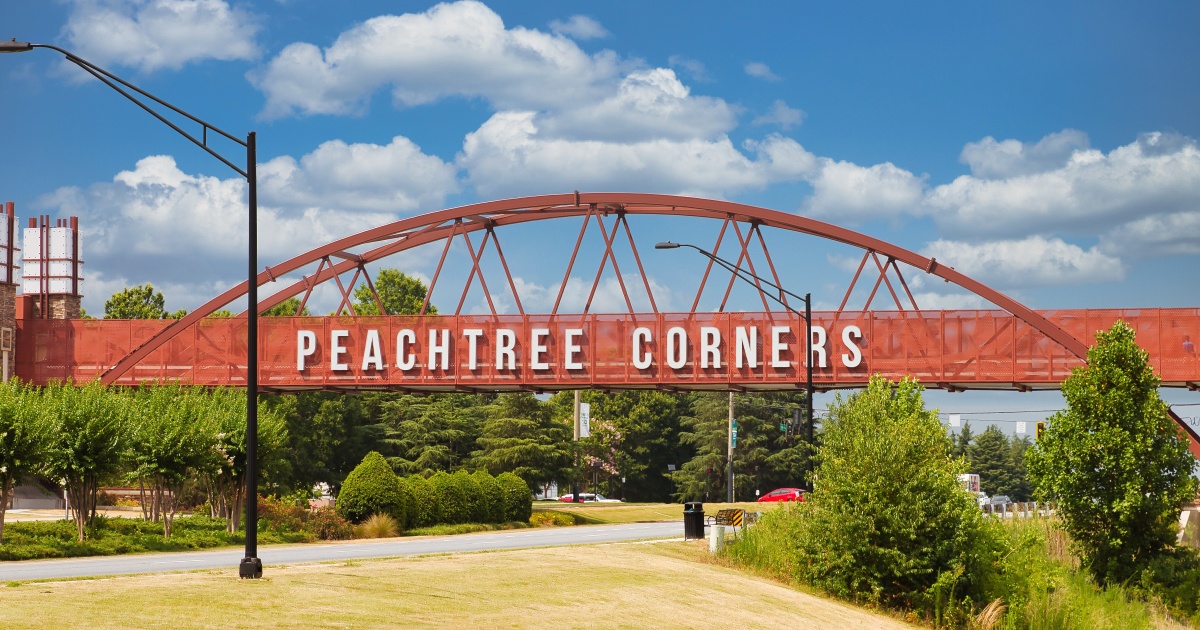
At the time of this article’s publication, I have still yet to visit the bright, tech-rich city of Peachtree Corners, which is nestled in Georgia’s Gwinnett County and part of the Atlanta metropolitan area. Peachtree Corners has become a well-known spot for a myriad of fun reasons; it hosts a mix of restaurants, high-end retail marts, and an inclusive community bustling with energy and activities galore.
And of course, there’s the Curiosity Lab at Peachtree Corners.
Essentially, the Curiosity Lab – located in the city’s 500-acre Technology Park – exists as a 5G-enabled “living laboratory” that continues to transform Peachtree Corners into a safe, real-world testing environment for world-renowned enterprises developing, testing and deploying new smart devices and services.
So, given the city is basically this super active “smart city blueprint” for the U.S., future-forward experts at its Curiosity Lab have made possible:
- A live 5G wireless environment with next-gen connectivity that is provided to companies testing IoT/smart technologies
- A zero-charge policy for the use of its smart city ecosystem; plus, officials move fast (much like at a startup), given the city government is the only agency with whom enterprises must coordinate (i.e. far fewer corporate roadblocks halting overall progress)
- Achieving NIST certification at the highest level of cybersecurity currently available
- A three-mile public autonomous and advanced vehicle (AV) roadway leveraging cellular vehicle-to-everything (C-V2X) technologies, electric vehicle (EV) shuttles, LiDAR, Bosch cameras, predictive traffic signals, “smart” street lights and pedestrian crosswalks, a dedicated fiber optic system and much more that powers IoT innovation and day-to-day civilian convenience in equal measure
(Pretty neat, if you ask us.)
I’ve also written previous stories (both here on Smart City Sentinel and on our sister sites, like IoT Evolution World) how – as we’ve covered here – big-time global enterprises step into the Peachtree Corners ring, if you will (i.e. Siemens and Seoul Robotics being two of them; read further here and here).
Now, there’s another big name being added to the list, in terms of collaboration with Curiosity Lab and Peachtree Corners:
Seyond.
Seyond describes itself as a global leader in image-grade LiDAR technology. Its LiDAR systems are able to map environments with exceptional range and “ultra clarity” (up to 500 meters) with high-resolution, high-fidelity imaging that picks up even the smallest of details. By providing stable, uninterrupted vision for consistently reliable detection capabilities (including advanced detection for pedestrians, roadside objects and smart-assisted vehicles, to name a few), Seyond’s high-performing LiDAR sensor solutions continue to be embraced across automotive, smart transportation, rail transit, and industrial automation teams around the world.
The long-story-short version?
Seyond’s collab with the Curiosity Lab + Peachtree Corners makes perfect sense.
According to the official announcement, this deal will allow Seyond “to deploy and validate its LiDAR solutions with real-world results in an effort to create safer streets and smoother traffic flow for both vehicles and vulnerable road users, or VRUs, in Peachtree Corners.”
“LiDAR technology is going to change the way cities look at managing vehicular and pedestrian traffic,” said Curiosity Lab Executive Director Brandon Branham. “LiDAR allows the city to collect data on traffic movement, congestion, wrecks, near misses and even pedestrian activity, while simultaneously protecting everyone’s privacy. Seyond’s solution takes the capabilities of LiDAR one step further and enables us as a city to evaluate how we can make our major intersections safer and more efficient for VRUs and everyday traffic.”
“Especially with Peachtree Corners’ multi-use trail expanding,” Branham added, “this technology will allow us to evaluate if we need to extend crosswalk times for pedestrians to ensure they cross major intersections safely, identify if we need to redesign intersections to be more efficient with higher-volume traffic, adjust traffic signal timing and more. With Seyond’s solutions, we will be able to see farther, clearer and react faster to transportation and VRU needs across Peachtree Corners.”
“Curiosity Lab’s shared public domain available for testing, deployment and validation is one of the many characteristics that attracted us to collaborate with the organization,” said Seyond co-founder and CEO Junwei Bao. “By collecting data from high-volume intersections across vehicular and pedestrian traffic, we will be able to improve the quality and reliability of detection results, which can help validate Intelligent Traffic Solution-based use cases. Our technology can be used at a signal intersection but also across parking, large areas of pedestrian crossings and more. Curiosity Lab and Peachtree Corners will allow us to explore these use cases in a real-world environment as we continue to advance and validate our solutions for public use to improve safety for all.”
Learn more here.
Edited by
Greg Tavarez





